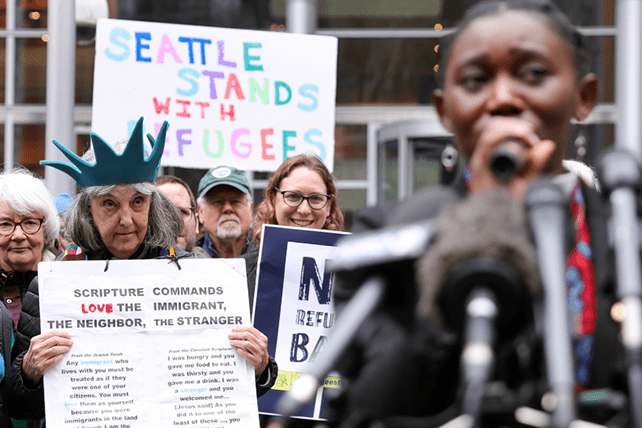(RNS) — One week after blocking the efforts of President Donald Trump’s administration to shutter the refugee admissions system, a federal judge in Washington state ordered the government to produce a status report by Monday (March 10) on its compliance with his ruling.
Speaking during an emergency hearing Tuesday in Seattle, U.S. District Judge Jamal Whitehead agreed with a suggestion by lawyers representing faith-based refugee resettlement organizations that the government produce a “status report” regarding an injunction issued last week that should have restarted the refugee admissions program.
“I am going to order the government to issue a status report,” Whitehead said, adding that he also supports a “joint status report,” allowing the plaintiffs to weigh in on “compliance.”
Asked directly by the judge whether the U.S. State Department or the Department of Homeland Security has once again begun processing refugee admission applications or entries, August Flentje, a lawyer representing the federal government, said there were “directions to resume” that “went out as soon as this court’s order (was) issued,” but added, “I don’t have any further information on the details there.”
The hearing in the case, known as Pacito v. Trump, comes in the wake of Whitehead’s Feb. 25 ruling, which sided with Church World Service, HIAS, Lutheran Community Services Northwest and individual refugees and their families in an effort to halt the president’s Jan. 20 executive order suspending the refugee program.
In his ruling from the bench, Whitehead said the president’s actions amounted to a “nullification of congressional will.”
However, the day after the judge’s ruling, the Trump administration sent out termination notices to the 10 refugee resettlement organizations in the U.S. Seven of those organizations are faith-based, and three — HIAS, Church World Service and Lutheran Community Services Northwest, an affiliate of Global Refuge — have joined nine individual plaintiffs in the lawsuit.
Lawyers for the faith groups called the emergency hearing to discuss the termination notices, with the judge raising questions about the government’s timing.
“It’s a remarkable coincidence to me that the termination notices would be sent within 24 hours of the court’s preliminary injunction,” the judge said, speaking to the government’s attorney.
Lawyers for the government suggested the timing was due to a different lawsuit, but the judge appeared skeptical.
“The timing of the government’s decision to terminate the contracts of the resettlement agencies just one day after the court issued its preliminary injunction raises serious concerns about whether these actions are designed to circumvent the court’s ruling,” Whitehead said at the end of the hearing.
In court, Flentje argued that because the Trump administration had not suspended two overseas contracts — with the United Nations’ International Organization For Migration and Church World Service’s Resettlement Support Center Africa — the administration was leaving grants in place “to facilitate refugee entries and admission to the U.S. at this point” and that the government could comply with the preliminary injunction without working with the refugee resettlement organizations.

